Apples
Apple trees are a great addition to the landscape and will provide an abundance of fresh fruit when given adequate apple tree care. They are one of the most popular fruit trees grown in the home garden but are among the most prone to pests and disease. Read on to learn how to recognize signs beforehand and take appropriate preventative measures for growing healthy apple trees.
-
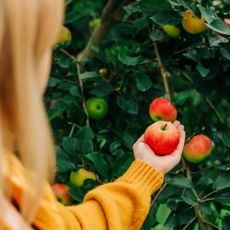
Complete Apple Tree Care Guide: Everything You Need to Know For a Tasty Backyard Orchard
Learn how to grow apple trees in your own backyard and enjoy bountiful harvests for years to come. From planting to harvest, these tips will help you grow.
By Kathleen Walters
-
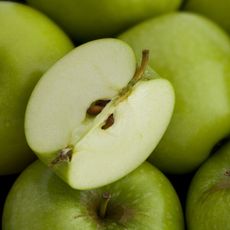
Can You Grow Apples From Pips? How To Plant Apple Seeds That Can Flourish
Knowing how to plant apple seeds can be a fun project that has the potential to lead to exciting future fruits. Find out a free way to grow your own homegrown apple trees
By Mary Ellen Ellis
-
Apple Cotton Root Rot Control: Treating Apple Cotton Root Rot Symptoms
If you have apple trees in your backyard orchard, you probably need to learn about apple cotton root rot symptoms. Click this article for what to look for if you have apples with cotton root rot, as well as information on apple cotton root rot control.
By Teo Spengler
-
Fortune Apple Tree Care: Learn About Growing Fortune Apple Trees
Have you ever eaten a Fortune apple? If not, you're missing out. Fortune apples have a very unique spicy flavor not found in other apple cultivars, so unique you might want to think about growing your own Fortune apple trees. This article will help with that.
By Amy Grant
-
Candy Crisp Apple Info: Learn How To Grow Candy Crisp Apples
If you love sweet apples like Honey Crisp, you might want to try growing Candy Crisp apple trees. Never heard of Candy Crisp apples? The following article contains Candy Crisp apple info on how to grow Candy Crisp apples in the landscape.
By Amy Grant
-
Apple Crown Gall Treatment – How To Manage Apple Crown Gall
Crown gall enters trees through wounds, often wounds inflicted accidentally by the gardener. If you have noticed crown gall on an apple tree, you'll want to know about apple crown gall treatment. Click here for information on how to manage apple crown gall.
By Teo Spengler
-
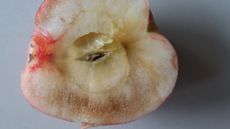
Soggy Breakdown Disorder – What Causes Soggy Apple Breakdown
Brown spots inside apples can have many causes, including fungal or bacterial growth, insect feeding, or physical damage. But, if apples in cold storage develop a ring-shaped brown area under the skin, the culprit might be soggy breakdown disorder. Learn more here.
By Ilana Goldowitz Jimenez
-
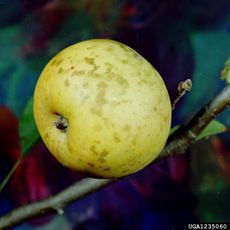
What Is Apple Blotch Fungus: Tips For Treating Apple Tree Fungus
Apples from your own tree are one of the greatest rewards your garden can provide. But what do you do if your apples look a little less magnificent than the ones at the market? There are several treatments for apple blotch fungus disease; click here to learn more.
By Kristi Waterworth
-
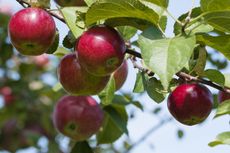
How To Fertilize Apple Trees – Tips On Apple Tree Feeding
While apple trees are moderate users of most nutrients, they do use a lot of potassium and calcium. Thus, these should be applied each year when apple tree feeding, but what about other nutrients? Find out how to fertilize apple trees in this article.
By Amy Grant
-
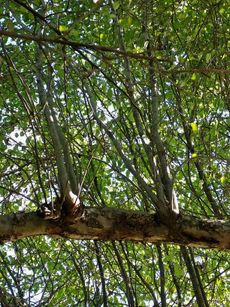
Water Sprout Removal – How To Prune Apple Tree Water Sprouts
Water sprouts are thin shoots that arise from the trunk or branches of an apple tree. Apple tree water sprouts drain vital energy from a tree without providing any benefit in return. Find out what causes unsightly water sprouts and what to do about them in this article.
By Jackie Carroll
-
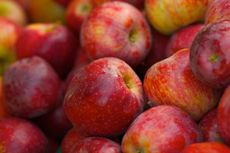
Braeburn Apple Care – Tips For Growing Braeburn Apples At Home
If you live in U.S. hardiness zones 5-8 and are looking for a delicious, easy-to-grow apple tree, Braeburn may be just what you are looking for. Click on the following article for tips on growing Braeburn apples in the landscape.
By Darcy Larum
-
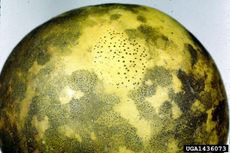
Flyspeck Apple Disease - Information About Flyspeck On Apples
Flyspeck on apples is a common problem, but it's simple to manage with some cultural modifications. Learn more about flyspeck and its control in the following article so you can keep it managed in the garden.
By Kristi Waterworth
-
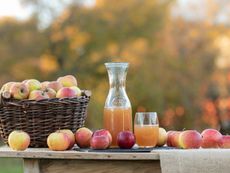
How To Make Apple Cider From Homegrown Apples
Click here to learn how to make apple cider from homegrown apples for winter celebrations, or anytime.
By Amy Grant
-
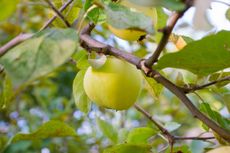
Earligold Information – What Is An Earligold Apple Tree
If you just can't wait for the late apple harvest, try growing early season apples such as Earigold apple trees. What is an Earigold apple? The following article discusses growing an Earigold apple and other pertinent Earigold information.
By Amy Grant
-
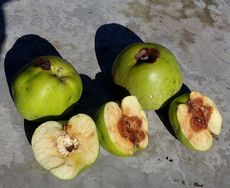
Apple Maggot Prevention: Apple Maggot Signs And Control
Apple maggots can ruin an entire crop. In this article, you will learn how to recognize the signs and take appropriate preventative measures beforehand in fighting off these pests.
By Nikki Tilley
-
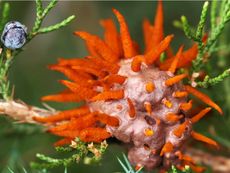
Tips For Cedar Apple Rust Control
If you're noticing unusual-looking, green-brown growths on your cedar tree, you may have been infected by cedar apple rust. Find out more about the disease and its management in this article.
By Nikki Tilley
-

What Is Apple Bitter Pit – Learn About Treating Bitter Pit In Apples
Apples have their share of disease and pest issues that many growers have experienced, but they are also susceptible to physiological disorders. One of the more common of these is apple bitter pit disease. What is apple bitter pit in apples? Find out here.
By Amy Grant
